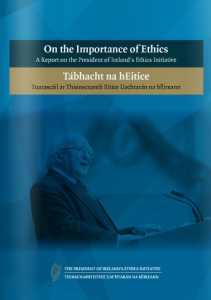 In 2014, I spoke at a public forum on cyberethics at the Trinity Long Room Hub. The event was part of the President of Ireland’s Ethics Initiative, and on Monday of this week, President Higgins launched On the Importance of Ethics, a report on the initiative. In his speech at its launch, President Higgins said that, during the conversations around the initiative
In 2014, I spoke at a public forum on cyberethics at the Trinity Long Room Hub. The event was part of the President of Ireland’s Ethics Initiative, and on Monday of this week, President Higgins launched On the Importance of Ethics, a report on the initiative. In his speech at its launch, President Higgins said that, during the conversations around the initiative
.. new important themes emerged, and many significant problems and obstacles were identified; for example the necessity of restoring trust in public institutions;, the need to return to the language of ‘citizen’ instead of ‘customer’ ‘taxpayer’ or ‘client’; and the consequences of returning to what I have referred to as a de-peopled version of the economy as we move out of recession. Again and again the importance of locating economic policy within a framework of social values that could create and sustain social cohesion came to the fore of discussions.
Speaking to Patsy McGarry of the Irish Times after the launch (report | video), the President expanded on this theme:
I can’t obviously comment on the platforms of the parties that will contest the election. But is it possible to have a decent society and at the same time continue to lower taxes for the purposes of securing the best short term benefit? People setting their face against tax and using the language that regards it as inevitably a great burden I’m afraid represents a view of the world [which] is not one that I think really can engage with what we are speaking about in the ethics initiative.
He made similar, if less pointed, remarks in interviews (here and here) with Paul Melia in the Irish Independent. Coming on the eve of a general election, these remarks have proved somewhat controversial. An Irish Independent Editorial welcomed them. Ruadhán Mac Cormaic, writing in the Irish Times, said that these comments “raised eyebrows” and “pushed out the boundaries” of the office of President. He concludes that President Higgins probably hasn’t crossed a constitutional line into impermissible criticism of government policy, though he “has now come closer to that line than at any point in his four-year-old presidency”. Shane Coleman, writing on the Newstalk website, pointed out that the stakes were raised when one political party seized upon the President’s remarks as “as reinforcing its core message”, but he concludes (quoting me) that the president had not crossed a constitutional line. For what it’s worth, the Tánaiste said something similar on radio yesterday (but then, she would say that, wouldn’t she?).
In the context of an earlier controversy where the President’s comments also ruffled some feathers, I argued that there must be a very strong reason to restrict freedom of expression, whether it is the rights of a person to comment on a politician, or the right of a politician such as the President to comment on a person’s plight. Prof David Gwynn Morgan of UCC argued at the time that it is reasonable to expect that the President would refrain from criticising in public a government decision or policy. In reply, Dr Eoin Daly of UCD argued that the Constitution does not confine the President to discursive platitude; and he concluded that our Presidents
… enjoy some constitutional freedom in the values and principles they project. It is well within the presidential ambit to formulate a sense of national values and to articulate broad matters of national concern.
I don’t find in Morgan’s views a strong enough reason to restrict the President’s freedom of expression. Daly’s views are the more convincing. They absolutely cover the President’s comments this week. And I look forward to more of the same.
One Reply to “Presidential freedom of expression – again”